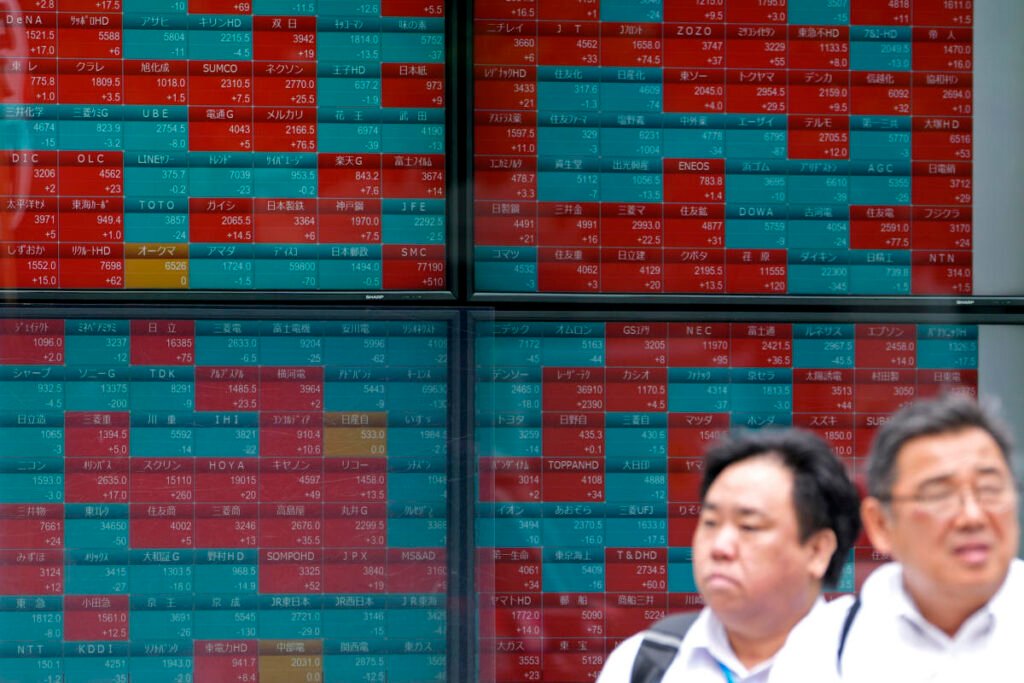TOKYO (AP) — Asian shares were mixed on Friday after Wall Street’s enthusiasm for artificial intelligence technology continued, sending stock indexes to record highs.
Japan’s benchmark Nikkei stock average rose 0.4 percent to 38,868.94 after the Bank of Japan left monetary policy unchanged but signaled its intention to move away from an ultra-accommodative policy stance and begin reducing its bond purchases.
“Even if the BOJ wants to signal the direction of monetary tightening, the key guide is gradualism,” Mizuho Bank’s Tan Jin Yi wrote in an editorial. “The reality is that the underlying confidence in the economy is fragile at best, if not dangerously so.”
Australia’s S&P/ASX 200 fell 0.3% to 7,724.80. South Korea’s KOSPI rose 0.3% to 2,763.24. Hong Kong’s Hang Seng Index fell 0.6% to 18,004.71 and the Shanghai Composite Index fell 0.1% to 3,025.39.
On Thursday, the S&P 500 closed at 5,433.74, up 0.2% from its all-time high hit the previous day, despite declines in most of its components. The Nasdaq Composite Index closed at 17,667.56, up 0.3% from its all-time high, helped by gains in technology stocks.
The Dow Jones Industrial Average fell 0.2%, to 38,647.10.
In the bond market, Treasury yields fell again as traders became more confident that inflation had slowed enough for the Federal Reserve to cut interest rates later this year.
The latest inflation report shows that prices paid at wholesale prices weren’t as bad as economists expected: Prices actually fell from April to May when economists expected them to rise.
That followed a surprising update on Wednesday that showed consumer-level inflation was weaker than expected. Federal Reserve Chairman Jerome Powell called the report encouraging and said policymakers needed more of that data before cutting their key interest rate from its tightest level in two decades.
“It’s not a question of if they will cut rates, but when,” said Niladri “Neil” Mukherjee, chief investment officer at TIAA Wealth Management.
High interest rates are dragging down parts of the economy, particularly manufacturing. A separate report released Thursday showed that more U.S. workers filed for unemployment benefits last week than economists expected, but the number is still low by historical standards.
Wall Street is hoping that job market and economic growth will continue to slow to ease inflationary pressures, but not slow enough to trigger a deep recession.
Companies whose profits are most closely tied to the strength of the economy, such as oil and gas producers and industrial companies, performed worse than the market on Thursday following the reports.
Dave & Buster’s Entertainment Inc. slumped 10.9 percent after reporting a bigger drop in profit and revenue in its latest quarter than analysts had expected, citing a “complex macroeconomic environment” among other factors.
Other companies have also recently detailed divisions among customers, with lower-income households still struggling to keep up with high inflation.
Thanks to the ongoing excitement around artificial intelligence technology, some companies are experiencing rapid growth despite economic pressures.
Semiconductor company Broadcom Inc.’s shares rose 12.3% after the company reported profits for its latest quarter that beat analysts’ expectations, again buoyed by demand for AI. The company also raised its revenue forecast for the year.
Tesla shares rose 2.9% after Chief Executive Elon Musk said early voting results showed shareholders were leaning toward approving his compensation package, after he had threatened to move his AI research to another company.
In the bond market, the yield on the 10-year Treasury note fell to 4.24% from 4.32% at Wednesday’s close and to 4.64% from 4.60% late last month. The yield on the two-year note, which is heavily influenced by Fed expectations, fell to 4.69% from 4.76%.
Most Fed officials plan to cut rates once or twice this year, and traders expect cuts to start as early as September.
Meanwhile, benchmark U.S. crude fell 44 cents to $78.18 a barrel in electronic trading on the New York Mercantile Exchange, while the international standard Brent crude fell 36 cents to $82.39 a barrel.
The U.S. dollar rose to 157.95 yen from 157.02 yen. The euro was little changed to $1.0735 from $1.0739.

